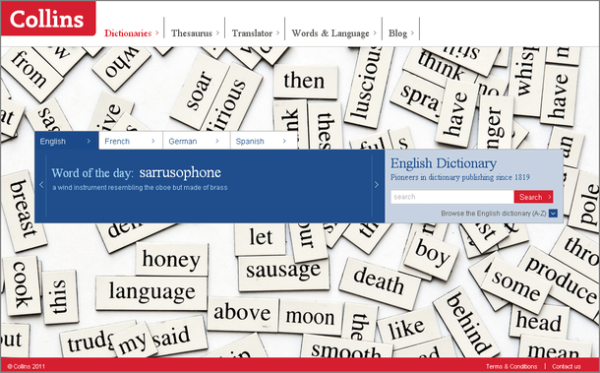A huge welcome, bienvenue, bienvenida and Willkommen to our 501,458 (and counting!) pages of words, their definitions and translations which are now settling in here at www.collinsdictionary.com. They’re so excited to be in their new home that they can’t stop showing off and doing all sorts of fancy things, like parading their word origins and flaunting their Flickr photos. We wanted to share all their tricks with you, so here’s a tour to introduce you to using our online dictionary and thesaurus.
We hope you enjoy our bright and fresh welcome page, which features eye-catching images to inspire your searches. Take a look at our word of the day; where the most unusual words love to hang out.
Dictionary Entries

When you look up a word, you’ll be taken to its entry in the currently selected dictionary.
English dictionary definitions are broken down into:
Headword: this is the word you’ve searched, or the root word of your word if you searched an alternative form. Some headwords with the same spelling have different origins, in which case they are displayed in separate sections.
Pronunciation: The Collins English Dictionary uses the International Phonetic Alphabet (IPA) (see our IPA guide). Click on the audio icon to hear the word pronounced.
Part of speech: Is the word used as a verb, noun or adjective?
Different meanings: The same word can have more than one meaning (sense), so we list every possible definition. This is ordered by number according to the most common sense.
Related Words: Related words and phrases.
The English dictionary used on CollinsDictionary.com is based on the Collins English Dictionary 11th Edition, expanded with many additional words and alternative forms. It is updated frequently, so you can be sure you’ll always be up to date with the latest definitions.
Synonyms

When a word is on the tip of your tongue, but you just can’t find it, a link to the full thesaurus entry gives you more information such as antonyms and examples of the word in use.
Commonness bar
![]()
Search “will” and watch the commonness bar filling up to the max. But change that word to “williwaw“, and the commonness indicator drops to show you’re in the presence of a rare word. If you’re looking to impress your friends with your extraordinary vocabulary, ensure your word is low on the commonness bar. “Williwaw” is so rare that no one even knows its history.
Word usage trends
Trace a word’s usage back over 10, 50, 100 or 500 years to discover how its popularity has changed over time. It’s not surprising that “computer” has rocketed into usage over the last 100 years, while “perambulator” has been falling out of use since 1941. Language nuts beware – this feature is highly addictive!

Word origin

Some of our words have the most intriguing histories. Did you know that “alarm” comes from the Old Italian all’arme meaning a call to arms?
Quotations
“In the beginning, was the Word.” When the word has been used by notable figures, you’ll find their famous quotes under Quotations. 
Our words schmooze with all sorts of celebrities, and feature in a list of famous quotes, from the Bible to Shakespeare, Martin Luther King to Walt Whitman.
Translations

Why only say it in English when you can say it in up to 35 other languages too? Under Translations, text and audio translations of your word are given in dozens of foreign languages including Arabic, Chinese and Japanese. When the translation is underlined, follow the link to its entry in a bilingual dictionary.
Usage Examples
We’ve included over 1 million usage examples so you can check that you’ve understood a definition. 
Read examples from newspapers, magazines, novels and nonfiction books to see how other writers have used the word. So if, for example, you’re using “balmy“, let Clive Barker show you how it’s done: ‘The night was balmy, the air fragrant with pine, and the walk proved more pleasant than she’d expected.’ Everville (2001)
Flickr photos

Using the Flickr photos you can see how people all over the world have chosen to illustrate and interpret the word you’ve searched. And it’s another way of defining your term, so look out for these striking visual representations.
Spread the word
Some words are too good to be kept to yourself, so the Spread the word function allows you to share them: through Facebook, Google+ and Twitter. If you love a word, share it with all your friends and followers.



